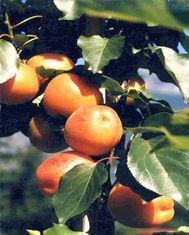
The first commercial season for UK-grown apricots was heralded with considerable excitement this year, especially by the select few retailers who managed to get their hands on some of the limited supply. With such a short window of retailing opportunity, the fervour was all over and done with in around 10 days at the end of July.
Such is life in the horticultural arena, according to top-fruit, soft-fruit and stonefruit growers Ian Johnston and Linda Twiss, proprietors of Highland Court Farm outside Canterbury, and three other farms in the region. But the pair are already thinking about how to step up their game for next year.
This year, Highland Court Farm produced just shy of nine tonnes of apricots, of which the vast majority was sold through Sainsbury’s via Chingford Fruit Limited - an achievement that has been nine years in the making.
At that time, Migrant (which has since become amalgamated with Chingford) had offices at Highland Court and one of its buyers, who had contact with French breeder Pierre Roux, persuaded Johnston and Twiss to experiment with Tomcot, a variety he believed had great potential for the UK.
And, Roux, it seems, was right, although it has been something of a slow burner, to say the least, and dependent on some chance good fortune, Johnston suggests. “We are learning a lot as we go along,” he says. “It was in the fifth year that we had the first crop, which we tried to market locally and to wholesalers but we did get russeting. We have really only had two good crops - last year where we had about 5t and this year where we had 8-9t.”
This year, the crop had a much better appearance and sized up well, with fruit reaching 45-50mm on average. “We had very little russeting,” Johnston explains. “We thinned the fruit a lot more and should have actually thinned it even more, which we will know for next year.”
With these points ironed out, Johnston believes prospects for UK apricots are distinctly promising. “What excites me is although the skin is a fraction tougher than the French fruit, the flavour is fantastic,” he says. Twiss agrees, adding: “Everyone who tried them commented on the intensity of their flavour. They are not as juicy as some apricots, but firm.”
The pair has plans to plant extra Tomcot in the coming year, although this is unlikely to take place at Highland Court. “I am now looking at one of our other sites, near Sandwich,” says Johnston. “It has a south-facing bank and the right soil, and is completely protected, with very little wind. We have learned a huge amount about pruning and the importance of the soil. Compared with French growers, in the UK we have never been as concerned with soils but we should be because it can make such a difference.”
The prospect of greater volumes will no doubt be music to the ears of local shoppers who were particularly disgruntled not to find Kentish apricots in their branches of Sainsbury’s, while some supplies made it all the way up to Scotland. “With volumes so limited, the system only selects stores on size and Kent only has small stores so we were not able to pull product out and prioritise Kent, but that is something we will work on for next year,” says Huxley.
According to Sainsbury’s figures, apricot growing is not a bad business to be in at the moment.
“Peach sales are not as strong as nectarines but apricots fit somewhere in between them,” Huxley says. “All these cereals which now contain apricots, are helping to raise their profile and they are high in folic acid, so there is a health incentive. And having local produce always helps to draw attention to a category.”
Johnston has heard talk that one of his fellow Kent growers has plans to dabble in apricots, and while he would always be quick to share the tricks of the trade with anyone, he is keen to highlight that the crop would not suit all. “The economics are fairly marginal so commercially it does not make a huge amount of sense for me to plant a lot of it,” he says. “Thankfully, we have enough other products to play around with niches like this but I think it will always be a niche so it wouldn’t be wise for small producers to consider it because it will never generate enough and there is a danger of losing concentration on the stuff that does make money.
“I can’t be as confident with apricots as with other crops. With plums even if the crop looks a bit short you know there will be enough whereas with apricots, if the season was really poor, I couldn’t be sure of having anything at all.”
While Johnston and Twiss have no plans to alter their traditional commitments - 220 acres of blackcurrants, largely for Glaxo SmithklineBeecham, 400a of apples, 40a of pears, 30a of plums and 15a of cherries - innovation is what keeps the industry interesting, and the pair vows to keep an open mind when it comes to expanding their remit. “We are going to persevere and plant more apricots and we are already thinking about what else we might grow - blueberries look interesting.”






No comments yet